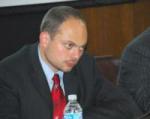http://www.worldaffairsjournal... Vladimir Kara-Murza
World Affairs
Perhaps the most important requirement in an election is that voters have a choice. It sounds trivial, but that is something that has been lacking in most Russian elections held under Vladimir Putin’s rule. In both the latest presidential elections that the Kremlin decisively “won”—in 2008 and 2012—genuine opponents (including former Prime Minister Mikhail Kasyanov and veteran liberal leader Grigory Yavlinsky) were disqualified from the ballot before voting even started. Those who repeat the Kremlin’s talking point about Putin’s “popularity” would do well to remember that, after 2000, it has never actually been tested in a real election against real opponents.
This model of “elections without choice” also extends to the regional level. Having been forced to reinstate direct elections for regional governors in the face of mass pro-democracy protests in 2011 and 2012, the Kremlin quickly qualified them by adding a requirement that candidates must collect signatures from a certain number of municipal legislators in order to gain access to the ballot. Given that local elections are also heavily controlled, and that most municipal deputies are loyal to (or can be coerced by) the authorities, this creates a vicious circle whereby the incumbents can, in effect, hand-pick their own opponents. The “municipal filter,” as it was dubbed, has been used to disqualify strong opposition candidates from gubernatorial ballots—as with Oksana Dmitrieva in St. Petersburg or Lev Shlosberg in the Pskov Region.
This week, the “filter” has been applied yet again. Yevgeny Roizman, the directly elected mayor of Yekaterinburg—Russia’s fourth largest city that stands on the border between Europe and Asia—will not be a candidate for regional governor in September’s election after falling short of the required number of municipal signatures. Roizman, a political maverick who defeated the ruling United Russia party in the 2013 mayoral election, is considered to be the most popular politician in the Urals and was thought to have significant chances against the Kremlin-backed incumbent. He has long been known for his independent behavior, and not only in local affairs. The Yekaterinburg mayor has called for the release of Russian political prisoners and has criticized the Kremlin’s war on Ukraine. Instead of the customary portrait of Vladimir Putin that adorns the offices of bureaucrats across Russia, he has put up a picture of the poet Josef Brodsky.
Without Roizman, voters will have a “choice” between the incumbent governor and a handful of shadow boxers who had no problems collecting the required signatures. The mayor called the upcoming election illegitimate and urged voters to boycott it, as has Grigory Yavlinsky, founder of the liberal Yabloko party that had nominated Roizman for governor, and anticorruption campaigner Alexei Navalny. Navalny himself continues to tour Russia as he opens campaign headquarters across the county in his bid to challenge Putin in next year’s presidential election. Officials from the Central Electoral Commission have already indicated—well in keeping with the tradition of disqualifying Kremlin opponents from presidential ballots—that Navalny will not be registered as a candidate in 2018.
The Kremlin and its propaganda machine frequently accuse the Russian opposition of plotting a “Maidan”—a Ukraine-style popular uprising against the regime. As the history of such uprisings—not only in Ukraine, but also in other countries such as Serbia or Georgia—shows, they usually happen when citizens are denied free and fair elections. If anyone is preparing a future “Maidan” in Russia, it is the Kremlin itself.

